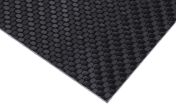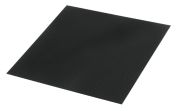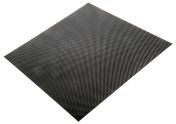Carbon Fibre Sheets
Carbon fibre sheets are reinforced composite materials in sheet form, manufactured from carbon fibre fabric infused with epoxy resins and heated to a high temperature. Carbon fibre sheet has exceptional mechanical properties and it commonly used in industrial settings. Carbon fibre sheets are a lightweight yet highly durable protective sheet, available in a range of thickness and density sizes to suit your needs.
Carbon fibre sheets also include a wide range of benefits including low thermal expansion, corrosion and UV resistance, radiolucency and good electrical conductivity. Thus making carbon fibre sheets ideal for use in both industrial and electrical engineering applications.
How are Carbon fibre sheets made?
Composite materials are produced by combining a reinforcing fibre with a resin matrix system such as epoxy resin. This combination of fibre and resin provides characteristics superior to either of the materials alone and are increasingly being used as replacements for relatively heavy metallic materials.
In a composite material, the fibre carries most of the load and is the major contributor to the composite material properties. The resin helps to transfer load between fibres, prevents them from buckling and binds the materials together. This process produces sheets with one smooth glossy resin rich side and the other rougher side showing the fabric weave detail.
Carbon fibres are produced from polymer fibres such as polyacrylonitrile. The initial fibre material is heated to around 1000°C causing 2-dimensional carbon-carbon crystals (graphite) to be formed when hydrogen is driven out. The carbon-carbon chain has strong molecular bonds and is what gives the fibres their high strength.
Applications for Carbon Fibre Sheets
Carbon fibre sheets are strong, stiff, and lightweight. They are an ideal choice for applications where lightweight and superior performance is important, such as components for aircraft, automotive, rail and high-quality consumer products.



